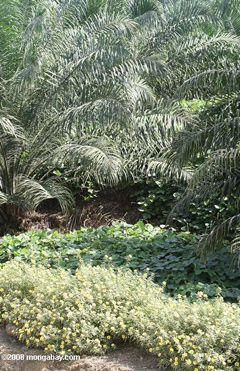Will consumers pay 10% premium for sustainable palm oil?
10% premium for sustainable palm oil?
mongabay.com
May 21, 2008
Will consumers pay a premium for a product that is less damaging to the environment? The palm oil industry intends to find out whether buyers will put their money where there mouth is.
|
|
The first shipments of certified eco-friendly palm oil will arrive in Germany during the second half of 2008 according to the head of OVID, a German edible oil industry group.
As reported by Reuters, OVID Chairman Wilhelm Thywissen told a press conference that palm oil certified under the Round Table for Sustainable Palm Oil (RSPO) initiative may be 10 percent more expensive than non-certified palm oil.
Producers have been under pressure from environmentalists who say that palm oil production can be damaging to the environment when the oil seed is grown on recently converted rainforest lands. A study published this month in the journal Conservation Letters showed that more than half of oil palm expansion in Malaysia and Indonesia between 1990 and 2005 occurred at the expense of forests. Other research had shown that oil palm plantations contain up to 80 percent less biodiversity than logged forests and that oil production on tropical peat lands is responsible for large emissions of greenhouse gases into the atmosphere.
 Nitrogen-fixing cover crop (to reduce the need for fertilizers) and flowers that support pest-eating insects (to reduce the need for chemical pesticides) in an oil palm plantation in Malaysia. |
The industry has responded to critics by highlighting the high productivity of palm oil. As the highest yielding oil seed on the market, oil production from oil palm requires less land than that for other crops including soy, rapeseed, corn, and sugar cane. Nevertheless calls for consumer boycotts has led some industry members to form the RSPO, a eco-certification initiative that has won support from several prominent NGOs. The program requires members to implement standards to improve the environmental performance of palm oil production. Measures include a ban on clearing ecologically-sensitive lands for plantations, curtailing the use of fertilizers and pesticides, reducing pollution, and implementing “zero burn” policies.
Now with the first shipments of certified palm oil soon to reach Europe, the real test begins. Can environmental groups convince buyers to pay more for environmentally friendly palm oil? Failure could be devastating to the credibility of their consumer-awareness campaigns.
Related
Indonesian palm oil firms pledge to stop clearing rainforests May 13, 2008
Palm oil companies operating in Indonesia pledged to stop clearing forests for new plantations reports The Jakarta Post. The move is a response to growing criticism that oil palm expansion is destroying biologically-rich rainforests and contributing to global warming.
Unilever calls for ban on rainforest destruction for palm oil May 1, 2008
Unilever, the world’s largest consumer good company, will start using palm oil from certified sustainable sources this year and aims to have all its palm oil certified by 2015, according to a speech delivered today by CEO Patrick Cescau.
Amazon soy ban seems to be effective in reducing explicit deforestation April 3, 2008
An industry-led ban on soy production in the Amazon appears to be proving effective at reducing new clearing for explicit soy production, according to a survey published Monday by Greenpeace and the Brazilian Vegetable Oils Industry Association. The moratorium, which was signed by some of the largest soy crushers in the Amazon in response to a campaign by environmental group Greenpeace, went into effect in October 2006. While soy is believed to be having an indirect impact on deforestation by driving up land prices and competing with the dominant form of land use in the Amazon — cattle ranching — the news is a hopeful sign for conservationists.
More on eco-certification efforts for products derived from rainforest lands